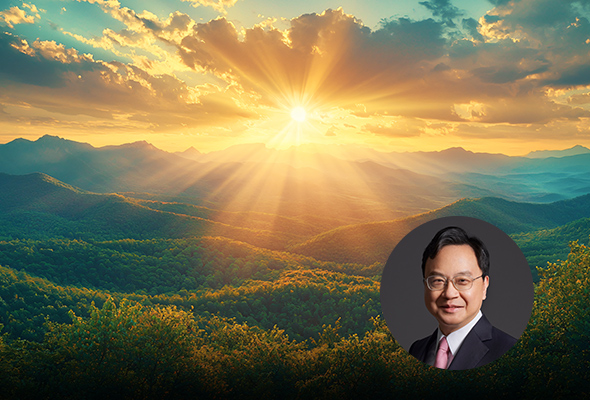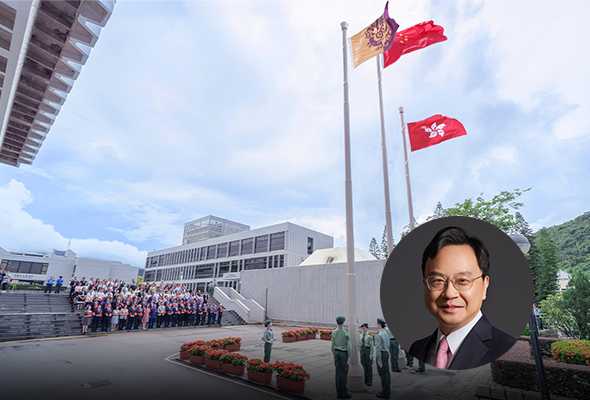Beyond life and death
Actor Michael Hui talks mortality with two medical professors
23 October 2025
Three faces gazed out from the ominous-looking poster, pensive amid the underlying morbidity. Large orange characters below advertised a curious event: “From heaven to hell: Doctors and comedian discuss life and death.” The teasing theme proved irresistible, as some staff members and students were still wearing medical scrubs while entering the auditorium, having come directly from the hospital building across the street. Many were clutching the poster, and within minutes, these giveaways had all been snapped up.
In the auditorium, unique dialogue was about to unfold between Dr Michael Hui Koon-man, director, actor and CUHK alumnus, and the University’s Dean of Medicine Professor Philip Chiu Wai-yan. Professor Tony Mok Shu-kam, Associate Dean (Translation and Entrepreneurship) and Chairman of the Department of Clinical Oncology, would facilitate the session.
Dr Hui made a name for himself as a comedian in the 1970s, a series of record-breaking blockbusters cementing his place in local film history. The veteran actor-director slowed his cinematic output at the turn of the 21st century, but in the past decade, he has gotten his second wind in crime thrillers like Where the Wind Blows, followed by family drama The Last Dance in 2024. Dr Hui’s stirring portrayal of a conservative Taoist priest unwilling to let his daughter take over his funeral business helped propel The Last Dance to the status of highest-grossing Sinophone film of all time in Hong Kong. Not only that, it also sparked many a conversation about the way people treated issues of life and death. This was how the Faculty of Medicine came to invite Dr Hui to Prince of Wales Hospital’s Shaw Auditorium on 29 September.
Breaking out of hell
The discussion opened with a hard-hitting question. “When do we begin to die?” Professor Mok asked his two interlocutors. In response, Dr Hui revealed that this question had been a preoccupation since he was young, and had become ever more pertinent as he grew older.
Dr Hui explained his diminished film output: Between the 1970s and early 1990s, he enjoyed constant critical and commercial success with a number of classics such as The Private Eyes and Mr Coconut. But as the new millennium drew closer, he found himself suffering from writer’s block.
“For almost two decades, I struggled to think of new ideas. I was doing the same things over and over. In some sense, I was dead for a while,” he said. This “spiritual death”, during which the thought arose that there was no point in creating further, troubled him more than physical infirmity. Building on an analogy his character had used in The Last Dance, he concluded: “When the scenery in your life’s journey begins to lose its lustre, that’s when death begins.”
His Taoist priest’s struggle to reconcile with his daughter taught him a couple of things about relationships, he said. “Hell is when we have pain in our heart and we can’t tell anyone about it. But ultimately it’s just because we can’t let things be.” In the grand scheme of things, Dr Hui suggested, the people we loved and treasured were already few and far between. “So, why don’t we try to forgive our enemies? If we can just let it be, then hell is well and truly broken.”
A brush with death
The speakers also talked about their own experiences with death. As a surgeon, Professor Chiu faced death very early on in his career when he was unable to save a young girl who had been stabbed in a brutal attack. He grappled with the need to break the news to her family, and took a long time to recover from it.
Dr Hui recalled a close encounter with death: while on holiday in Thailand, he had gone snorkelling and come face to face with a shark. As the animal circled him, his life flashed before his eyes. “In those few minutes, I saw the faces of the two or three most important people in my life.” A sense of calm enveloped him and he emerged unscathed – with an epiphany. “I’d always had trouble answering the question, ‘Whom would you save if both your mother and your wife fell into the sea?’ Now I know the answer,” he said with a mischievous grin.
United through CUHK
A student asked the trio about the one thing in their life they regretted the least, and, as if of one mind, all three speakers said: “Joining CUHK.”
Dr Hui traced the quick wit of his scripts to his education in sociology, calling it “the biggest influence on my life and career”. Since sociology was all about human interactions and values, he was able to use his knowledge in his writing. “It was helpful in creating characters, plotlines and especially jokes. Why does this joke make people laugh? Because it gives insight into the human condition.”
Professor Chiu talked of how he, as a medical student, had found both love and his future calling at CUHK. “Not only did I find fulfilment as a doctor, but I also met my wife in this faculty!” he said to raucous laughter and applause. For Professor Mok, who used to practise in Canada, joining the University marked a turning point as well, allowing him to forge new connections and explore research opportunities.
A life without regret
While the very idea of death might be distressing, Dr Hui was sanguine instead. Living an extended life was meaningless, he said. Though personally irreligious, he suggested that a benevolent Creator would nonetheless worry about his creations getting bored.
“If you were given an eternity to live but could only do the same things over and over, that’s not very meaningful.” According to him, the average lifespan was enough for most people to do what they wanted; it was far better to leave when the allotted time was up, and live on in one another’s hearts.
It is this philosophy that helps Dr Hui face life and death with nonchalance. He had chatted candidly about the subject several times with his wife, and had requested that his ashes be scattered in the ocean, near a beach where he loved to fish in his youth.
“That way, I can disappear into my favourite beach. If you want to visit me, just stand on the beach, whisper a few words to me, and that would be perfect.” He gazed at his wife, sitting in the front row of the audience; in that moment, serenity reigned supreme.
By Chamois Chui
Photos provided by CU Medicine






















